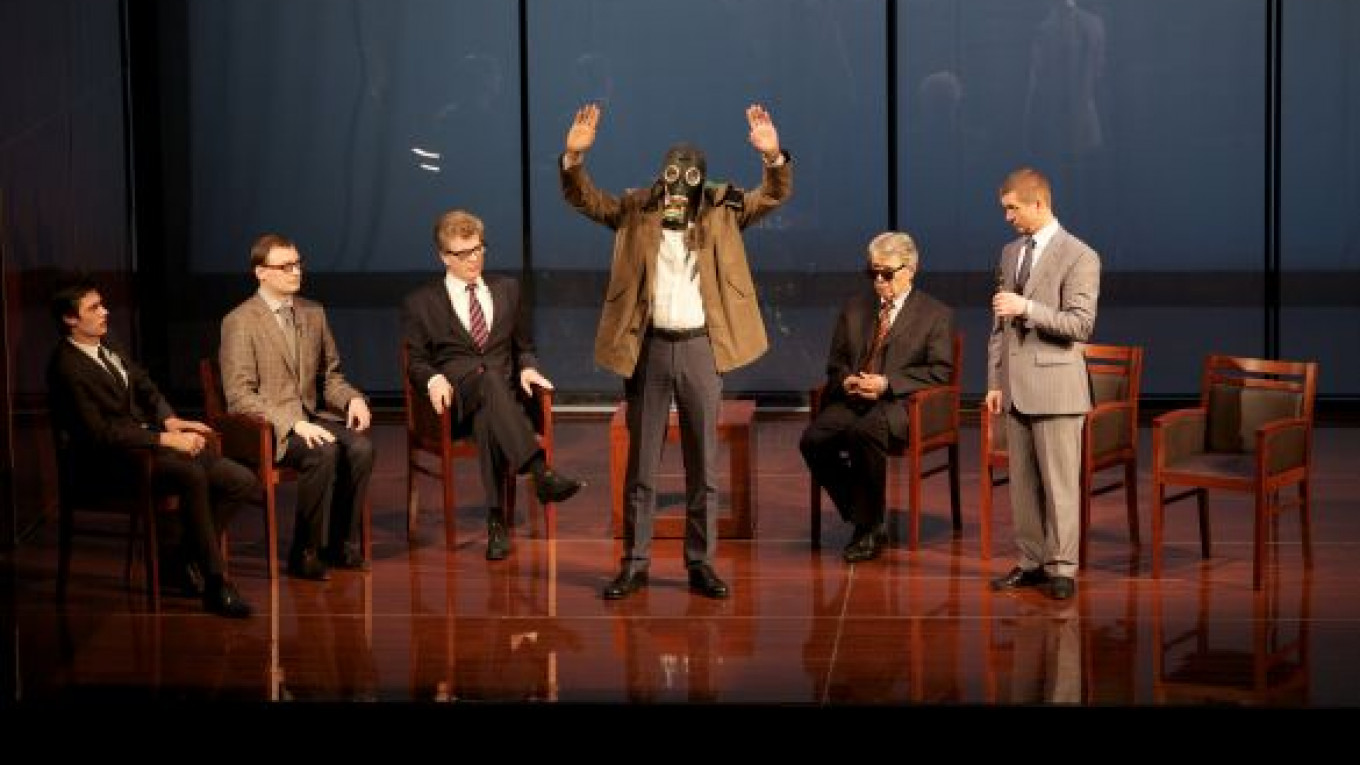Nikita Kobelev's production of Henrik Ibsen's "An Enemy of the People" accomplishes the inevitable. It puts contemporary politics on the big stage of a velvet-seated, mainstream Moscow theater.
We knew this was coming. Politicized theater has percolated at small venues for a few years. But the crossover into the wide world of the average spectator had not quite happened.
Konstantin Bogomolov came close at the Moscow Art Theater with his politically acerbic "An Ideal Husband." But that was kitsch and satire. At its best, Kobelev's "Enemy," adapted radically by Sasha Denisova, is blunt force politics.
The title, of course, is a political snake pit in the Russian context. Millions were murdered in labor camps from the 1930s to the 1950s, the official justification being that they were "enemies of the people." The notions of "enemies" of the state, or hostile "alien," "foreign agents," are again ascendant in the highly charged contemporary Russian political scene.
As "An Enemy of the People" opens its run, the Russian government continues taking aggressive action against untold numbers of activists, opposition leaders and organizations that authorities fear are not sufficiently "patriotic."
Kobelev's "Enemy" wades boldly into this controversial territory.
Denisova's text, called a "new version" in the program, kept the basic story of an honest doctor being ostracized by family and colleagues when he attempts to publicize the fact that a spa he is involved in is hazardous to public health. But Denisova completely reworked the play's language, tone and setting.
Town hall meetings from Ibsen's original become televised press conferences. The doctor's daughter, a teacher in Ibsen, is transformed into a precocious young woman who publishes a popular video blog on ecological problems. Numerous characters were cut entirely.
Some of the doctor's incendiary speeches sound as if they were inspired by public appeals we have heard in recent times by, say, jailed oil tycoon Mikhail Khodorkovsky or Alexei Navalny, the anti-corruption activist who is currently on trial for alleged financial misdeeds. But Denisova goes further, putting extremely harsh accusatory language into the mouth of the good doctor.
Infuriated that all those around him are actively seeking to suppress the information he wants to publish, the doctor finally goes on an extended verbal rampage, during which he calls everyone in his town "scum" or "sheep." Denisova's Russian word choice, "bydlo," is a term loaded with offensive characteristics.
Sure enough, when this epithet rang out on stage at the Mayakovsky the tension in the hall leaped noticeably. Some were clearly offended. Others were thrilled. It evoked scattered applause and a few shouts of encouragement. Spectators responded to the speech as if it were addressed directly to them, and I suspect it was.
Certainly Alexei Fateyev, who performs the role of Doctor Stockman, played it that way. Mocking those on stage, Fateyev's Stockman often turns to the audience as if it is his last resort. Hounded by his conscience and the corruption of everyone around him, he embraces his status as a social pariah until it leads to tragedy.
Fateyev turns in a fine performance as the lone-wolf crusader.
Stockman may know that the waters feeding the town's spa, a growing and lucrative tourist trap, are contaminated. But his brother (Igor Kostolevsky), who is town mayor, refuses to endanger the local economy and actively blocks public access to the truth. A sleazy newspaper editor (Sergei Udovik) and an unprincipled journalist (Vladimir Guskov) provide two-faced private support and public censure. Attacks on the doctor escalate from verbal to physical, and — in a clear reference to contemporary trends — lead to a family discussion of whether it might be best to leave the country.
Mikhail Kramenko's sophisticated set uses screens, live video feeds and a hanging, rotating box that serves as an apartment and a newspaper office, and looks like a television set when facing the audience directly.
It must be said that this production struggles through a sluggish first act. Although appealing to a hip audience that expects quick cuts and speedy development, the makers failed to provide precisely that early on. The second act began with a reduced number of spectators in the hall, although that was probably not caused by anyone suffering political discomfort.
The focused political onslaught began in Act Two and this is when this production came into its own. Ultimately "An Enemy of the People" is a fascinating and sometimes powerful take on the clash between honesty and corruption in the modern world.
"An Enemy of the People" (Vrag Naroda) plays Wed. and June 25 at 7 p.m. at the Mayakovsky Theater, located at 19/13 Bolshaya Nikitskaya Ulitsa. Metro Arbatskaya. Tel. 495-690-4658. . Running time: 3 hours, 10 minutes.
Contact the author at [email protected]
Related articles:
A Message from The Moscow Times:
Dear readers,
We are facing unprecedented challenges. Russia's Prosecutor General's Office has designated The Moscow Times as an "undesirable" organization, criminalizing our work and putting our staff at risk of prosecution. This follows our earlier unjust labeling as a "foreign agent."
These actions are direct attempts to silence independent journalism in Russia. The authorities claim our work "discredits the decisions of the Russian leadership." We see things differently: we strive to provide accurate, unbiased reporting on Russia.
We, the journalists of The Moscow Times, refuse to be silenced. But to continue our work, we need your help.
Your support, no matter how small, makes a world of difference. If you can, please support us monthly starting from just $2. It's quick to set up, and every contribution makes a significant impact.
By supporting The Moscow Times, you're defending open, independent journalism in the face of repression. Thank you for standing with us.
Remind me later.


